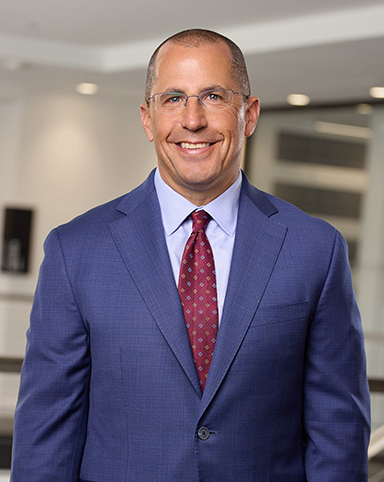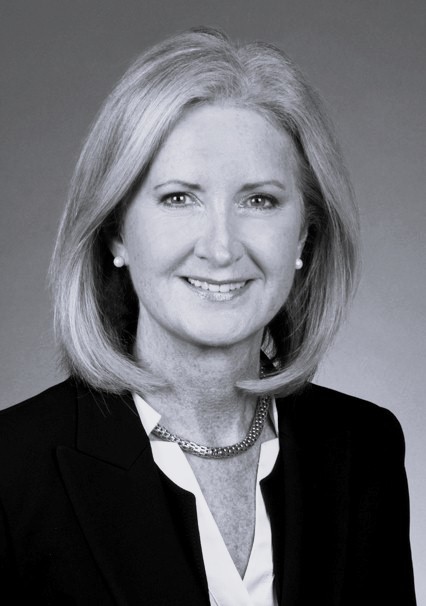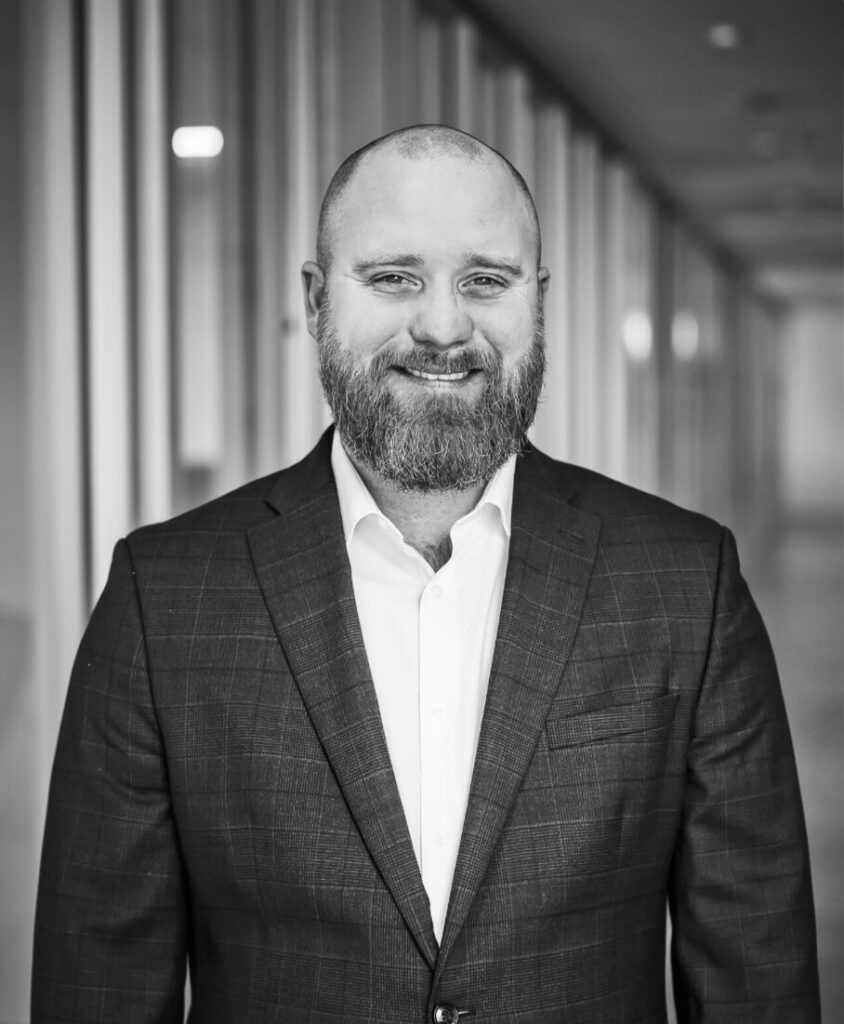The Alexander Group, recognized as one of the country’s top CEO executive search firms, presents “Five Questions With Extraordinary Leaders,” our interview series with visionary industry leaders. In this installment, Managing Director Sally King interviews Michael Caplan, COO of Lowenstein Sandler, discussing leadership style and advice for those seeking a Chief Operating Officer role at a large professional services or law firm.

Michael Caplan believes in diving in.
All in.
It’s how he connects with his team, peers, partners, and clients. Caplan is intentional about his leadership style, setting expectations and seeking growth opportunities. He interacts, listens, and strategizes with the goal of positively impacting his professional leadership team, attorneys, and firm.
With more than 30 years of experience in the accounting, financial, investment, and consulting industries and 20 years of corporate legal and law firm experience, Caplan takes a holistic approach to his role.
He combines his understanding of the business of law and his financial acumen with effective communication skills and a strategic approach to challenges.
Caplan joined Lowenstein Sandler in March 2024. A national law firm with over 350 lawyers based in New York, New Jersey, Palo Alto, Utah, and Washington, D.C., the firm represents leaders in virtually every sector of the global economy, particularly emphasizing investment funds, life sciences, and technology. It is recognized for its entrepreneurial spirit and high standard of client service.
Caplan believes Lowenstein is poised for exponential growth, and he is ready to lead the way.

Read on for Caplan’s “Five Questions With Extraordinary Leaders” conversation with King.
You recently joined Lowenstein but have served in this kind of role for over 10 years. How did you navigate your transition from Professional Services firms to law firms?
I’m a business-oriented COO, and I have a client’s perspective. This approach has served me well in corporations across various sectors and serves me well as COO at Lowenstein.
Learning about law firm culture requires an understanding of practice groups, building relationships with partners, and how these elements work together in a competitive industry. But effectively leading any organization requires knowledge of basic business principles: What is
demand? What is productivity utilization? How should we think about our business differently? Why is revenue different from profit?
Additionally, I am very focused on how the law firm’s professional staff should be involved in client development, specifically in areas of operational expertise. I take these basic tenets and incorporate them into what I call “the business of law.” At Lowenstein, we have even branded these as “BEST—Business Enterprise Solutions Team.”
As a law firm COO, I work with both the attorneys and the business professionals who support them to facilitate the firm’s success. Internally, we are a team, and every participant understands their own value —what each of us brings to the firm. Externally, we need to differentiate ourselves from our competition in an increasingly competitive environment. One of the ways we do this is by helping clients with their operational effectiveness and operational excellence.
Lowenstein was looking for a leader on the business side who could help them think about how the firm can grow and adapt in the future —across different categories and different work streams. I am now part of the leadership team that is discussing and planning how to scale the firm. This was a big part of what attracted me to join Lowenstein. After working in legal operations for two decades, this opportunity was more than being strategic. It is leading-edge and innovative, and leading a team that can engage in driving revenue and the business is pretty cool.
I relish having this seat at the table at Lowenstein, where the partners are eager to discuss best practices and growth strategies.
Recently, we’ve been focused on a strategic plan that leverages the business of law to serve our clients, our colleagues, and our communities. We are looking at lateral partner hiring, innovative technology and solutions, data and business intelligence, cross-selling, conflicts, and lateral partner hiring, and we are looking at these elements in new ways. This approach will enable the firm to grow, be competitive, and STAY competitive— not only in our tier-one practices but how across all of our different groups from a cross-selling, collaborative perspective.
What have some of your biggest challenges been in law firms? Having 20/20 vision in hindsight, what might you change, and what might you do exactly the same?
The role of a COO is different today than it was ten—even five years ago. A COO must communicate with partners so that the focus is on attracting profitable clients and efficiently running the business and practicing law. In addition to building a focus on lawyers, the firm must also invest in firm infrastructure and non-legal talent.
Today, we are seeing law firms that resist change. The COO can play a big role here. Firms have to allow their COOs to have a voice, and partners with senior leadership need to promote and mandate that the COO have a voice. A strong COO with excellent communication skills can bring the partners in and drive change. On the other hand, if a firm has a COO unwilling to get out in front of a partnership that’s not letting the COO get out front, it will be ineffective in taking its law firm to the next level.
It is important for any COO to establish relationships with partners so that they feel heard. Trust is very important. Once that is established, a COO can then effectively communicate to the partners how investing in the firm will help their practice. Any strategy will only be successful if the culture and partnership support it.
Currently, there is a highly competitive marketplace for clients and C-Suite leaders. I’m trying to hire chief officers, different levels of directors, and others within my professional staff with a strategic view of the business. Of course, every other law firm is seeking the same type of talent! However, Lowenstein Sandler offers an excellent proposition for highly qualified candidates because our firm truly values the opinions of its business strategists.
Now, looking back as an 11-year tenured COO of a law firm, I don’t get too bothered by the challenges that I faced earlier in my career. I’ve learned to take challenges in stride, reflect, and partner with other people to solve problems. I spend a lot of time with partners and our Chiefs brainstorming, strategizing and thinking about messaging and how to handle people challenges: how do we think holistically about where we want our teams to go and how do we get them there?
Running a law firm is not that difficult from an operational standpoint. But running a firm of partners and professional staff is the hardest part of the job. The people part of the job is challenging because you are literally managing “talent.” Every day can bring up new challenges from a people standpoint, but it is both challenging and invigorating as a leader.
What are some of the challenges you see on the horizon that you will need to address, and what is your game plan?
AI presents an opportunity, but it’s a challenge. Where do we begin? How much data do we have? What is the data that the clients have? How are we thinking about our rate structures? How are we thinking about our hiring plans? How are we thinking about leveraging our profitability model? How are we getting in front of these communication plans with our clients?
AI presents a significant opportunity to engage clients, attorneys, and professional staff, but how do we address this? What comes first, second, third? Every vendor has a solution. I get 500 emails a day from unfamiliar vendors who want to solve all my problems.
Our chairman, Gary Wingens, and our full leadership and strategic planning committee are very focused on AI information and innovation. That is how we are managing this roadmap of products, data, communication, and client relationships as we guide our firm’s growth.
The other challenge is the growth of the lateral partner market. As a competitive national law firm, we want to grow our practices and become a destination firm for our key practices with lateral partners. But we are competing with many firms for the same lateral partner hires. The challenge is how we continue to be that destination firm and grow with the strategic plan of lateral partner hiring; as COO, I have to evaluate how to scale my teams to meet our projected growth.
If we hire 200 lawyers in the next two-and-a-half to three years, how many BD people do I need? What does practice management mean? How do we manage paralegals? How do we look at conflicts? How do I look at my recruiting team? How many billers and collectors do we need? Yet, at the same time, how do you manage the expense growth before the revenue comes in when you’re making partners so you continue to be very profitable? This analysis requires a strategic view of how to manage the challenges of expense and investment, along with the revenue that will come in behind it.
What do you look for when hiring your chief team or people who will report to you, and how do you ensure you have a good mix of leadership attributes amongst your team? What is your leadership and communication style?
I believe that chief officers all need to have real leadership. To me, this is table stakes. I operate as a COO, and I manage a team of people, but it’s a very flat organization. I love to embrace leaders and resources at all levels because I really try to truly create career aspirations for the folks who are on my teams. I want my teams to invest in their careers. It is not just about title and promotion, but there’s responsibility. Learn the firm, learn the partners, learn the practices, lead at every level. I’m really looking for people that are hungry, people that love to work, are excited and have ideas, and are not afraid to talk about them.
What advice would you give someone wanting to be a COO at a large professional services or law firm? How does Lowenstein manage succession for these roles, and how do you think other firms manage that process?
First of all, my advice to somebody who wants to be a COO is that you have to really invest in getting to know that firm. You have to truly take on the job as an owner.
I tell everybody whom I hire to take the first six months to a year and get to know people, build relationships, learn the firm, go on a listening tour, get on airplanes, go to different offices, make sure you work out a lot because you’re going to have a lot of meals and a lot of coffee, but listen and learn. If you really truly want to be successful at the job of the COO, you have to build trust with your partners. And then you also have to build trust with your team under you, so that they will embrace you as the COO and keep you in the loop.
A reputation can be made or broken very quickly. You have to be willing to make those investments and sometimes sacrifices to be a very successful COO. The other piece of advice I would give is you’ve got to understand the financials. You have to truly get how the firm makes money, how we bill, how we collect, how we look at rates, how we price, what profitability means, what staffing and leverage utilization, productivity, demand go down the line, what is contribution? If you don’t understand the numbers of a law firm, it’s very hard to be a COO.

















